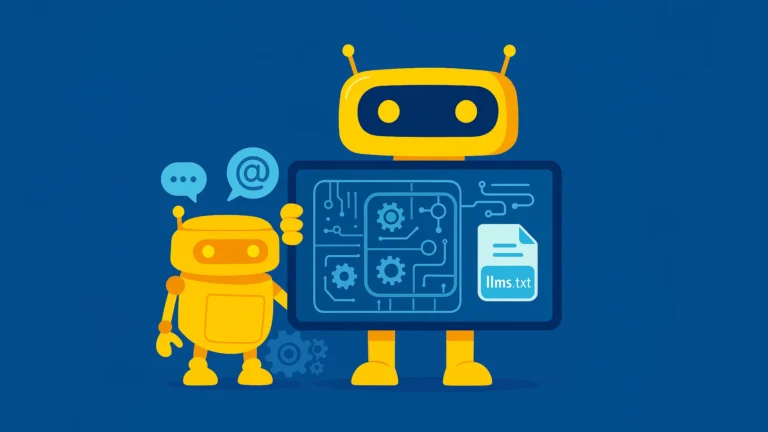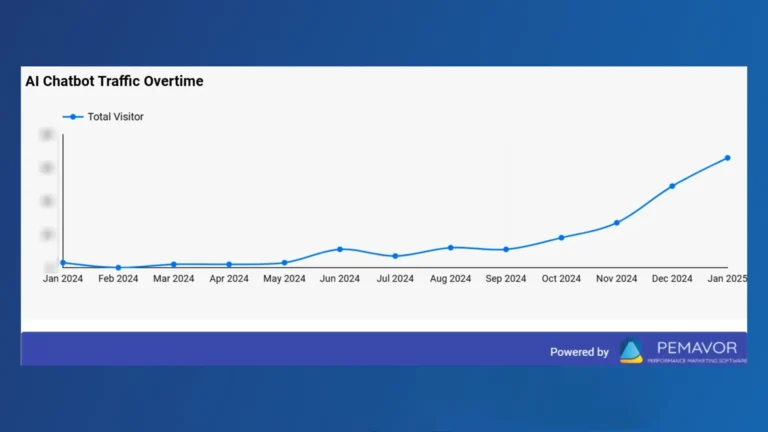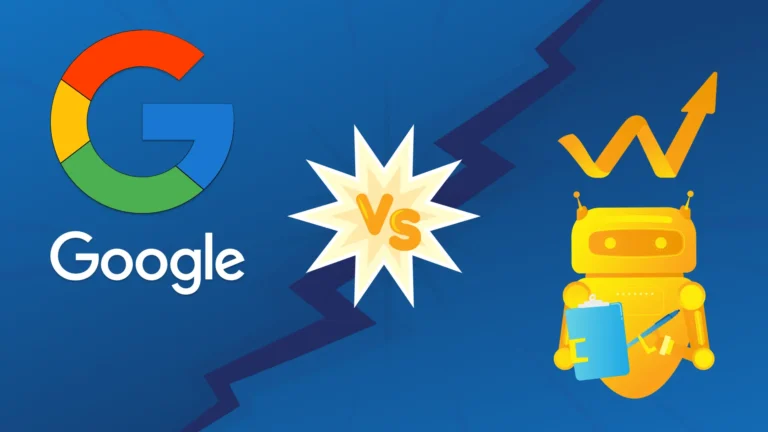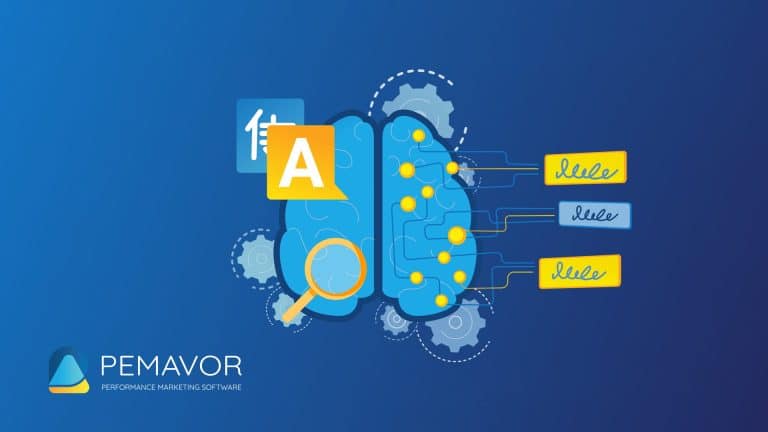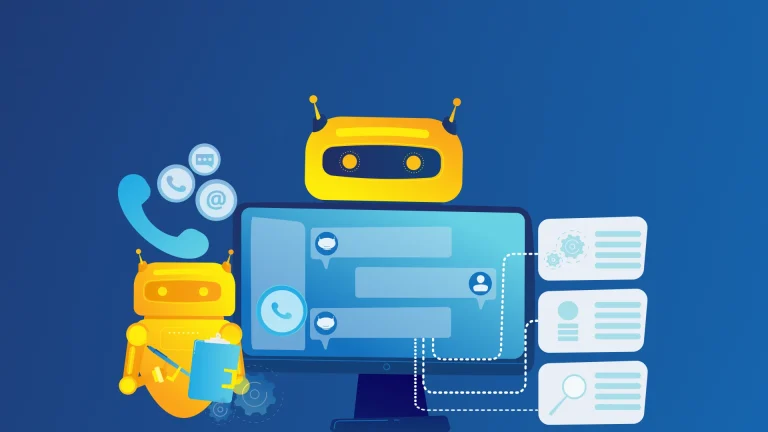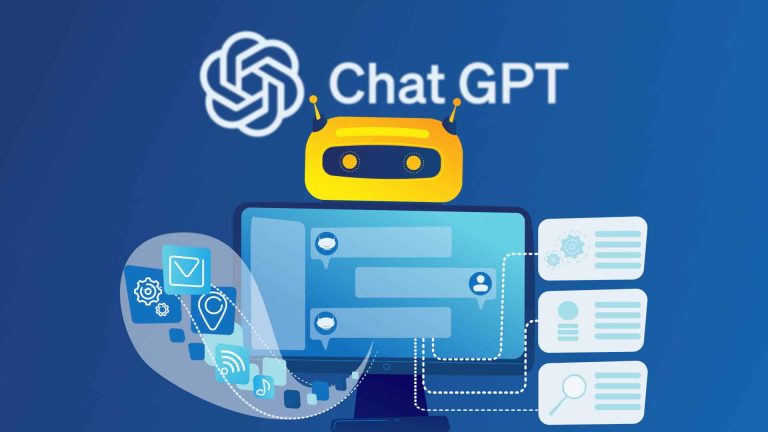Artificial Intelligence (AI) has been recognized as one of the central enablers of digital transformation in several industries. Robotics, automation, speech recognition might be considered as an industry itself. But, AI can be applied by SMBs to improve their businesses, their services, their processes or their products, too. Many SMBs are struggling in finding their path among the big, unclear AI world in this digital century.
Do SMBs need AI?
PEMAVOR has a software and offers custom solutions, which optimize Digital Marketing actions „with and without“ AI. It is important to mention with and without AI, because not all problems need to be solved with AI. AI is a methodology, just like simple statistics, and simplicity can also be enough to solve specific problems. Additionally, we consult several companies including Startups, Corporate/Enterprises, but also SMBs. Our focus is enabling AI in companies, who are not using it yet or extending AI usage in companies who are further in AI maturity, regardless of their size.
A typical AI use case from our customers
PAESSLER AG, Software Manufacturer, Global Player, 300+ Employees.
They have millions of leads who show interest to their software product. With historical interactional data, we score each lead to see their likelihood of future purchase. As early as possible. This scoring is then used to optimize the sales operations because you cannot approach this many leads by sales calls or by offering individual demos. In Marketing, the scoring is used for intelligent targeting in lead acquisition to scale the business, by using good leads as goals in marketing campaigns and investing more on such campaigns. Finally for high scored leads, the Website is personalized with special messaging or special funnel offers like onboarding, etc.
Whereas the most important thing is to figure out the best value within the entire business to decide where scorings can be operationalized. With the same approach, we discuss which next opportunity could be interesting. Should we build a recommendation system to personalize even more or should we add forecasting to the reports? But, in any case, we have to figure out the effort vs. business gain first.
Why is AI actually a wrong description?
Artificial Intelligence is a wrong description. It is actually not AI. Scientifically, if you claim to do AI, you have to be able to compare your output with the “being intelligent”. Intelligence per se is not defined, though. Is intelligence reached when we deliver acceptable answers to common questions? Is intelligence reached when a computer wind at chess against a human? What is the comparison?
The next intelligence level can’t be reached when one is reached. Intelligence doesn’t end. So, what is done by AI fields is actually letting machines learn from given data. Predictive Analytics uses machine learning algorithms to predict future outcomes. So, it is common to use AI, because AI sells. Also saying Machine Learning, Predictive Analytics is even more confusing to business users.
Predictive approach offers you the possibility to make decisions, driven by the probability of a future event based on historical data.
Predictions calculate the probability of a future event and you decide on your actions if the probability is low or high.
What to do if you feel fear or hesitation against AI?
Is AI not comprehensible for you?
Solution is extending the explainability and communication between business professionals and AI practitioners. Let the AI people explain you what they’re doing and let them communicate the business results. If they can’t explain it in a way you understand well, it is their fault, not yours!
Are you concerned about your future career?
No, you will not lose your job. You can rather expend your skills in AI with a little bit of effort. Remember, nobody is programming websites anymore, there are ready to use tools for websites nowadays. So, developers can do cooler stuff than website programming and their leaders accomplish more interesting projects, which return more business value.
You don’t know why to apply AI in your business?
AI can help develop smarter products and services. AI makes business processes and functions (such as marketing, sales, maintenance service even HR) more intelligent. Automating repetitive tasks, enables people for more value-adding activities.
You don’t know how to apply AI in your business?
Get to know the common use cases of AI in your industry/business. Most use cases are typical.
You don’t know who should apply AI in your business?
You can start working with one experiences data scientist, who can work together with your data engineers. Or, you might think of upskilling your existing employees! Whereas you don’t have to start with a big bang directly, you can see with some basic projects if they’re benefitial to you. Bu tif you’re serious about AI, an AI strategist is strongly recommended!
You don’t know when to apply AI in your business?
The maturity level of your companies data usage and data strategy, defines how you can benefit from AI.
You’re scared that AI costs a lot, needs a team to invest, etc.?
Any costs and expenses should bring profit. So if it is expensive, it isn’t applied right. Don’t start investing, if the basics aren’t beneficial to your business, yet. When you start, you need someone who analysis the state of your maturity and builds up an AI strategy for you. As long as the possible cases are clearly identified and the goal is noticed with a measurable story including deadlines for operationalization, the ROI is a calculation like any other invest.
Imagine you have a case, where Sales can close 10% more deals with the current time and money invest. The operation should be possible in one year. Then, you can invest max. 10% of your current sales for an AI team within a year. Sure, AI projects include research time and fail often but with a good strategist, you have the best chances for good results. And imagine, if you’re making 100 Mio. € sales very year. A boost of 1% would be 1 Mio. €, so we aren’t speaking about low budgets. Please note, this was an extremely simplified example. In reality, it has to be evaluated, which cases are possible and which min. and max. return is to expect to estimate the ROI.
What are the maturity levels of a company to use AI?
You hear of “AI” everywhere, on conferences you attend, on papers you read. AI is a too general definition. It is nothing to plug-in and play! It is a methodical approach to solve business problems with data in analytical universe. Predictive Analytics calculates the probability of a future event and Prescriptive Analytics uses the predictive analytics’ calculation of what is likely to happen, it recommends what future actions to take by evaluating the possible action, accordingly.
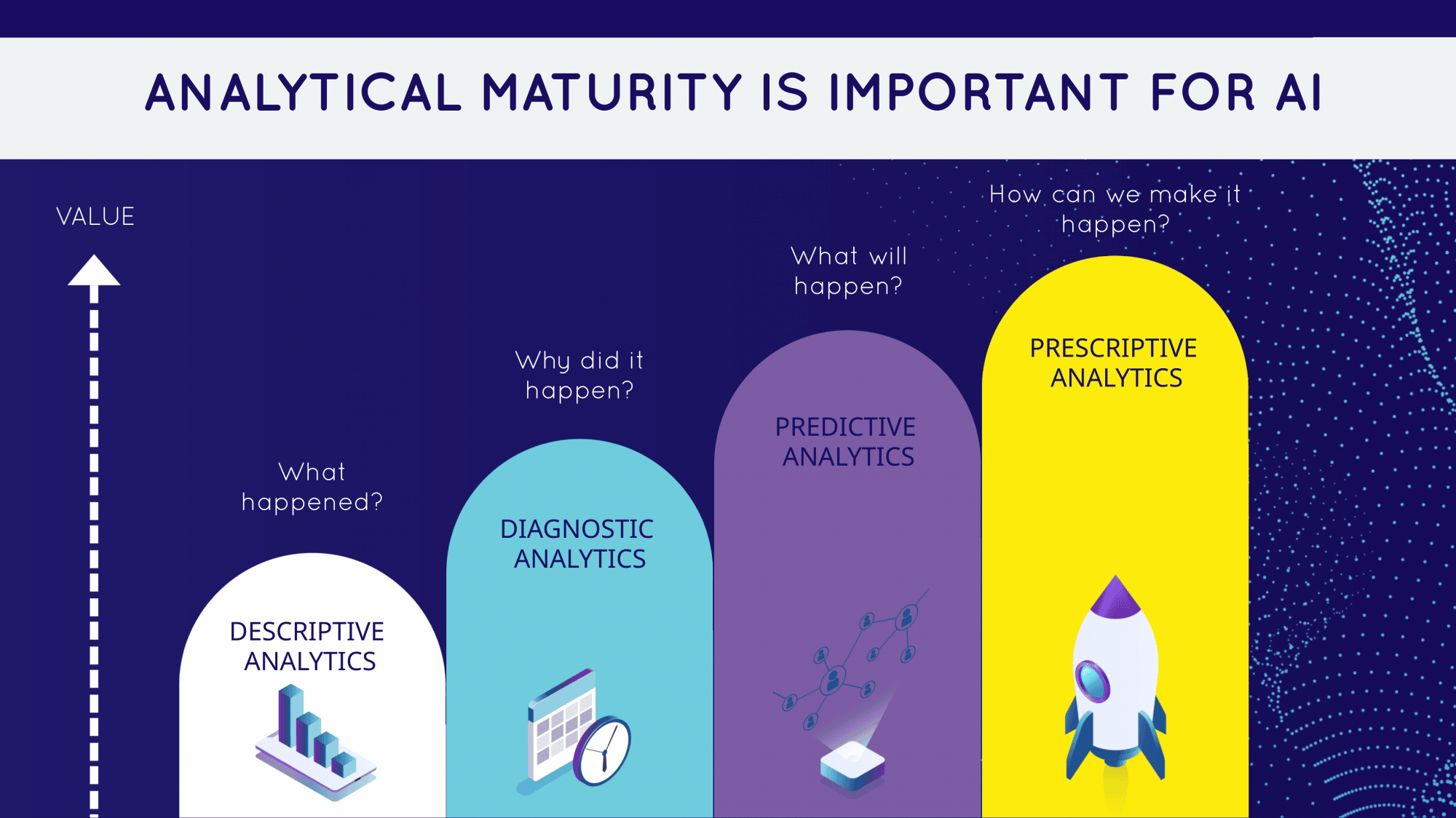
LEVEL 1 – No or less data yet: DATA COLLECTION LEVEL
- What are you doing with your data right now?
- How much data do you have?
- Do you have a data Strategy?
- Are you using department wide or company wide reports?
- Did you define some KPIs, that are related to evaluate your business and your goals?
AI need a lot of data and AI will bring you new KPIs and if you don’t have the infrastructure of using the results, your company might not be AI-Ready, yet.
Start with collecting data, and
- track your website,
- track your interactions with a CRM,
- define your targets and find data to track your targets,
- create KPIs,
- set up a reporting system to track your goals against your tracking effort.
You can’t start early enough to collect data this because AI needs lots of historic data with positive and negative results on your target as observations.
You have data? You can start using tools with AI. Understand AI in basics so you know what you’re buying. Many tool vendors claim to use AI, it isn’t always true. Let them explain what they’re doing, many AI solutions are comprehensible for business professionals and practitioners! Let them explain you! “We solve it with AI” should not insecure you. “Selling with AI“, that is like saying something „we solve the problem with computers“ in 70s.
Level 2 – Data, reporting and analytical awareness existing: ADAPTATION LEVEL
AI is a collection of algorithms; their results can be used in a methodology to support probabilistic decision making. Instead of using segments, algorithms help us evaluate individuals, people or lead or visitors, etc. The algorithms can take lots of input from those individuals. Also, you can again build segments to adjust your sales, marketing or business actions on them.
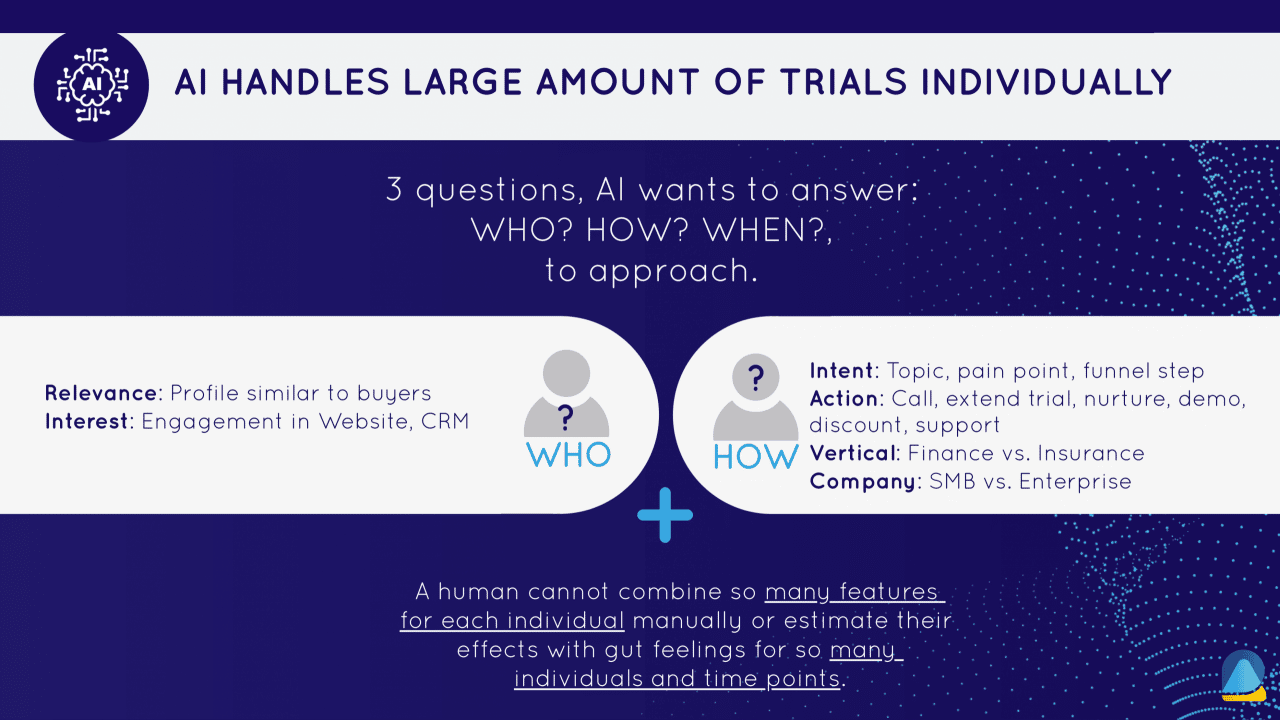
Imagine, if you had couple of data points, like current salary and historical credit payment behavior of someone, and both are good, you could calculate the future probability of his future credit payment habits easily. AI isn’t doing anything else then combining such data points, so called features. The benefit is that, with the help of computational power, AI can take huge amounts of individuals and huge amount of data to calculate a probability for each.
AI is simple to understand if you would be dealing with a few data items. It’s difference is:
- AI evaluates large amount of trials individually,
- AI can use huge amount of data.
AI use cases in business:
Don’t let yourself get distracted by dystopic cases, which sound fancy. Learn your common business cases. Some common use cases are:
- Chat Bots
- Recommendation systems (Products, Content, Amazon)
- Personalization (Website and Services): Think of your daily products in use: Netflix, Spotify, News feeds, Facebook
- Assistive Search
- Lead Scoring
- Churn Predictions
- …
In practice, it’s difficult to say in general which case will help your business most. Example: with 10.000 visitors, you might not need to personalize your website but if those visitors have a high CVR to purchase a product of 10.000 € or more: You might want to approach them individually. So, you might start searching for a tool support now or start applying some simple custom AI solutions. Keep in mind, a little prediction goes a long way:
Predicting even a bit better than guessing delivers tremendous systematic benefit in large scale operations.
Eric Siegel, Founder of Predictive Analytics World Conference Series
Level 3: Large operations, “enough amount of” data: EXPERT LEVEL
You want to operate better than your competitors. You want to optimize your existing processes. You want to do the best out of your data. This is the stage where you need at least one data scientist who understand your business and the toolset, mostly a team of data scientists, data engineers, data analysts, team leaders and analytics translators. Translators help business2nerds, leaders understand the top 10 algorithms and use cases to decide on the custom solution possibility, data engineers must operationalize, etc.
At one point, Lead Scoring will not be enough, you will want to apply deeper techniques like Uplift Modeling into your scoring to see if your actions really caused the future predictions. Or you want to predict the outcome of possible actions to select the best action to reach your future predictions.
The key is to get someone who understands the business problem and can translate it into the AI solution. Without knowing the problem, the best AI solution is useless. Problem must be formulated, so the AI expert can find a solution with his team.
If you need assistance on any level, feel free to make an appointment for a chat, we’re eager to talk with new business and listen to their challenges all the time.
